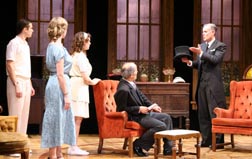
Lucy Komisar
"The Breadwinner" a fine
revival of 1931 Maugham play
Comic satire of wealthy stockbroker who rebels against spoiled wife and
kids
 |
| The Breadwinner -- Joe Delafield, Alicia Roper, Virginia Kull, Robert Emmet Lunney, Jack Gilpin. Photo by Theresa Squire |
"The Breadwinner"
By W. Somerset Maugham.
Directed by Carl Forsman.
The Connelly Theater, 220 East 4th St. bet Aves A & B.
212-868-4444.
Opened Sept. 10, 2005.
Reviewed by Lucy Komisar Sept. 9, 2005.
Closes Oct. 2, 2005.
http://www.keencompany.org.
This 1931 satire by Somerset Maugham is as fresh and pertinent as the day it hit the London stage. His comic but subtly biting drama about marriage and families must have shocked audiences at the time.
Four spoiled rich kids, all in tennis whites, muse about how they’d like to spend their parents’ money as well as how boring and unnecessary their folks are. Shouldn’t they be put away some place, in some country cottage with a few hundred pounds a year, after they’ve shifted their wealth to their heirs?
Meanwhile, the wives – who are sisters -- are bored with their husbands and plot how they can maneuver them into financing a summer for women and kids on the Riviera. The men would slog along in their jobs as stockbroker and solicitor. The wives, by the way, are sure that the kids and husbands dote on them. And they agree that the role of husbands is to provide: “It’s in self-sacrifice that a man fulfills himself.”
Well, imagine everyone’s surprise when the plodding old “breadwinner,” Charles (Jack Gilpin), announces his view of their family values, including what he thinks of his wife of 19 years and his son and daughter.
The play, which takes place in upper class Hampstead, reflects on the decade after World War I, when men who had faced battlefield horrors returned to what seemed to many to be meaningless lives. It skewers the trap of “family responsibility” interpreted through a philosophy of consumerism, which forced the breadwinners into what they recognized as lives of boredom and drudgery, even at the level of the upper middle class.
Charles, the stockbroker hero of Maugham’s story, has nothing to say to his snooty, empty-headed upper-class son Patrick (Joe Delafield), who thinks everything is coming to him, even, ironically, a Labor seat in parliament. He also reassesses a marriage that has become a charade that hides the fact that each partner thinks the other a bore.
The action takes place in designer Nathan Heverin’s upper-class drawing room with faux marble columns and three large arched windows looking onto the garden.
Carl Forsman, artistic director of the Keen Company, which won a special Drama Desk award for excellence last season, has mounted a first-rate production that would grace any stage. He provides the requisite tongue-in-cheek comic veneer used perhaps at the time to sugarcoat the play’s socially radical argument. Forsman’s reputation has won him a stellar cast, including some Broadway veterans.
Joe Delafield (in the Roundabout’s Tartuffe) is appropriately arrogant and preening as the egocentric twit who shrinks in horror when his father suggests that this self-styled future Labor MP become a member of the working class and get to know the proletarians from the inside.
Jennifer Van Dyck (in Hedda Gabler on Broadway, Orson’s Shadow Off Broadway) is a comic delight as flighty, intense, charmingly manipulative sister-in-law Dorothy; a high spot is the over-the-top scene where she declaims about the hidden love she bears.
Alicia Roper (The Dance of Death on Broadway) is excellent as a rueful Margery, who works herself into massive self-pity and descends into absurdity as she declares how she has brought beauty into Charles’ life – Armenian folk songs, for example.
Jack Gilpin (The Elephant Man on Broadway) is a rock solid Charles, though sometimes he seems to announce his feelings rather than portray them.
Robert Emmet Lunney (The Graduate, Democracy, A Doll’s House on Broadway) seems to carry an inner sadness as the trying-too-hard father, Alfred, who wants to be pals with his kids and doesn’t really connect to anyone, including wife Dorothy.
Where to go for food and drink: Next door to the theater is
Hurapan Kitchen, a Thai-Pan Asian restaurant with bamboo-covered ceilings,
white brick walls and green plants. It was a pleasant evening, and the façade
glass was pulled open to create a semi-outdoor café. Under chef Taweewat
Hurapan, the restaurant features entrées (mostly $10-$16), dim sum
and tapas ($4-10). We shared a delicious post-play repast of mini shrimp
spring rolls with Chinese plum dipping sauce ($4) and chicken Satay with
peanut sauce ($5), accompanied by a glass of Chardonnay ($6) for me and
a sake cocktail for my friend. Hurapan Kitchen, 234 East 4th Street, 646-313-1987.